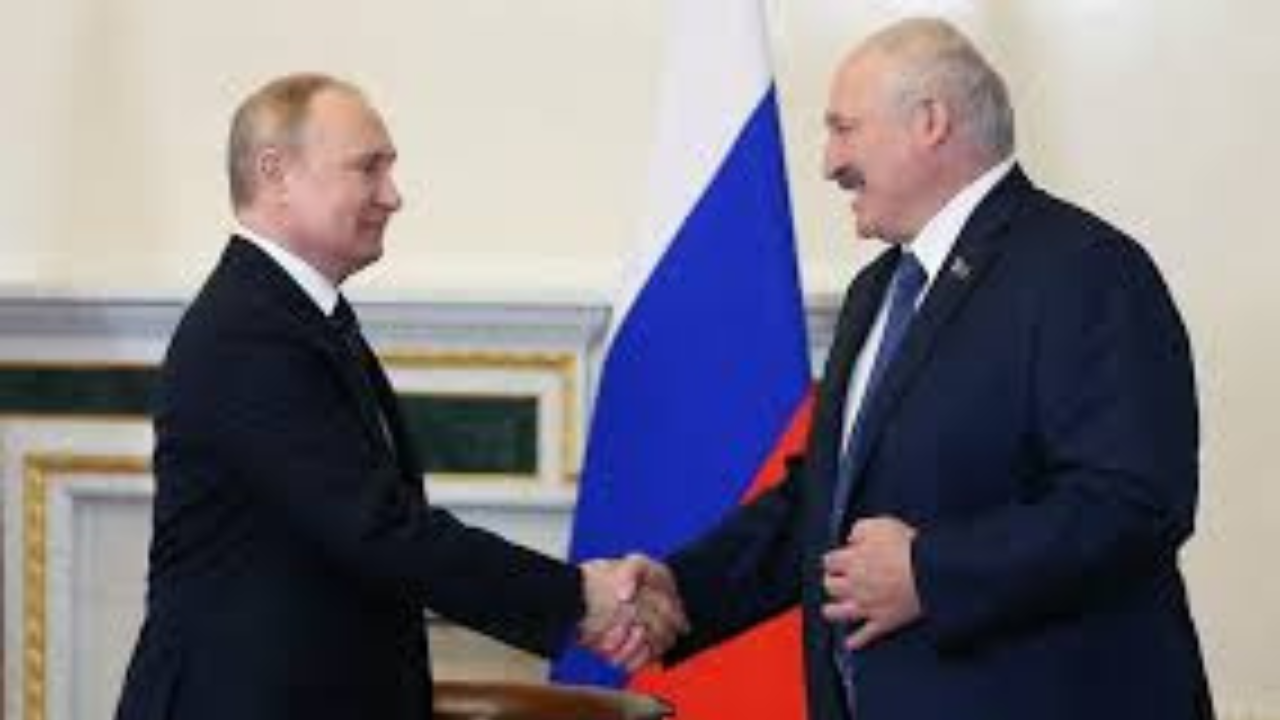NEW DELHI: Russian President Vladimir Putin on Thursday, arrived in Belarus for a two-day visit. He was received by his Belgian counterpart Alexander Lukashenko. Lukashenko assured Putin that they would discuss “security issues at the forefront, and tomorrow we will discuss economic issues together with our colleagues from the governments.”
Earlier, Putin traveled to China earlier this month and is expected to visit Uzbekistan on Sunday.Additionally, he hosted Bahrain’s King Hamad bin Isa Al Khalifa in the Kremlin earlier on Thursday.
Meanwhile, Lukashenko appointed a new chief of the country’s military general staff on Thursday demonstrating unwavering loyalty to the Kremlin, as assumed by analysts. Major General Pavel Muraveyka, who assumed the role of chief of Belarus’ General Staff and first deputy defense minister, is known for his public threats against neighboring NATO members Poland and Lithuania.
In October 2023, Muraveyka suggested that Belarus could seize the Suwalki Gap, a strategically important stretch of land along the Polish-Lithuanian border that connects the Baltic states with the rest of NATO and separates Belarus from the heavily militarized Russian exclave of Kaliningrad.
The appointment of Muraveyka is seen as a direct challenge to the West and a demonstration of Minsk’s complete loyalty and commitment to maintaining a strategic partnership with Russiaaccording to independent Belarusian analyst Valery Karbalevich.
Karbalevich also said that the deployment of Russian nuclear weapons in Belarus leaves Lukashenko with limited strategic options, effectively making him a hostage of the Kremlin and firmly tying Minsk to Moscow’s policies.
Both Russia and Belarus recently began military drills involving tactical nuclear weapons. Moscow announced its drills publicly for the first time on May 6, stating that they were a response to statements by Western officials indicating a potentially deeper involvement in the war in Ukraine.
Belarus launched its own maneuvers involving missiles and warplanes capable of carrying tactical nuclear weapons on May 7, while Russia’s exercises began this week. Moscow has emphasized that the tactical nuclear weapons deployed to Belarus remain under Russian military control.
Earlier, Putin traveled to China earlier this month and is expected to visit Uzbekistan on Sunday.Additionally, he hosted Bahrain’s King Hamad bin Isa Al Khalifa in the Kremlin earlier on Thursday.
Meanwhile, Lukashenko appointed a new chief of the country’s military general staff on Thursday demonstrating unwavering loyalty to the Kremlin, as assumed by analysts. Major General Pavel Muraveyka, who assumed the role of chief of Belarus’ General Staff and first deputy defense minister, is known for his public threats against neighboring NATO members Poland and Lithuania.
In October 2023, Muraveyka suggested that Belarus could seize the Suwalki Gap, a strategically important stretch of land along the Polish-Lithuanian border that connects the Baltic states with the rest of NATO and separates Belarus from the heavily militarized Russian exclave of Kaliningrad.
The appointment of Muraveyka is seen as a direct challenge to the West and a demonstration of Minsk’s complete loyalty and commitment to maintaining a strategic partnership with Russiaaccording to independent Belarusian analyst Valery Karbalevich.
Karbalevich also said that the deployment of Russian nuclear weapons in Belarus leaves Lukashenko with limited strategic options, effectively making him a hostage of the Kremlin and firmly tying Minsk to Moscow’s policies.
Both Russia and Belarus recently began military drills involving tactical nuclear weapons. Moscow announced its drills publicly for the first time on May 6, stating that they were a response to statements by Western officials indicating a potentially deeper involvement in the war in Ukraine.
Belarus launched its own maneuvers involving missiles and warplanes capable of carrying tactical nuclear weapons on May 7, while Russia’s exercises began this week. Moscow has emphasized that the tactical nuclear weapons deployed to Belarus remain under Russian military control.







